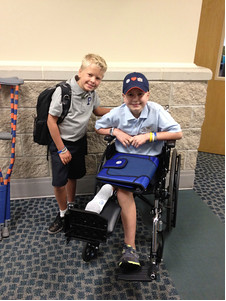How to Bear One Another's Burdens
THERE IS A COMMUNITY READY TO CARRY THE LOAD WHEN THINGS BECOME TOO HEAVY.
By Tiffany Moody, Perimeter School Mom
Our family was relatively new to Perimeter School when our world came crashing down. While it was with great intention that we chose a covenant education, we had no idea just how quickly we would need our new school family to support us.
Our oldest child, Bailey, began at Perimeter School in the third grade. In March of her fourth grade year, she was diagnosed with cancer. We were violently thrust into the most difficult year of our lives - one full of fear, chemo, amputation, endless hospital stays, and exhaustion like we had never known. And in those months, we were loved and served as only a real community can do.
During that time and in the challenging years since, we’ve learned a great deal about suffering, serving well, and the long-term effects of trauma. We certainly aren’t the only ones to have walked this path, and this summary isn’t exhaustive. It’s merely a humble attempt to use our pain to potentially ease the burdens of others.
The Seen vs. the unseen
The first part to ministering during suffering is being able to recognize it. At times, our family felt relief because our pain was visible. There was no possibility of hiding it. And since it was obvious, people were always full of grace and kindness toward us.
But in many instances, it is difficult to see what someone may be experiencing or to even know they are hurting and in need of support. Sometimes this happens because the situation is hidden, and other times it’s because we are too busy to notice. There are widows raising young children, moms fighting chronic illness, parents with cancer, siblings with special needs, couples on the brink of divorce, children and families dealing with adoption/foster care trauma, alcoholism, financial issues, and an endless list of difficult possibilities. Sadly, hurting children and adults are everywhere, and if we aren’t actively looking, they are easily missed.
ThE PrActical
The first rule in serving someone who is suffering is actually about what not to say. It’s best to avoid the phrase, “please let me know if I there is anything I can do.” In times of immense pain, the crisis will be all-consuming, both physically and emotionally. The family will either be too overwhelmed to pinpoint what they need or be concerned with being a burden and won’t feel comfortable asking for help. Vague offers do not provide relief, and they place yet another responsibility on the sufferer. If something needs to be said, then “I’m sorry,” is usually a safer option.
Practically speaking, what does help look like? Depending on the type or duration of a situation, there may be a need for one point person to organize a care team, but generally, the most basic needs are the ones to tackle first. Take them food (but just leave it in a cooler by the front door). Do the yard work every week. Arrange for someone to clean the house. Schedule a play date. If you are running errands, check and see if they need anything. Walk the dogs or take them to the groomer. A number of crises come with financial stress, so consider an account for donations. Providing gift cards for gas, groceries, or Target is wonderful as well. Drive the kids places and shower love on any neglected siblings. It’s also wise to consider other logistical problems in need of a solution.
While giving gifts is thoughtful, they can quickly accumulate, so proceed with caution. Take a few moments to think about the person’s day, decide where you are gifted and able, and then do that thing. The goal is to give the family one less responsibility about which to worry. Something that was always a welcomed surprise for me was the reminder that a thank you note was not necessary. While in the middle of the valley, most people don’t have the emotional bandwidth for small talk, and the idea of planning for more then the next hour can be impossible. Do not visit the home or the hospital unless your are in the inner circle and you have been invited. During trying times, people need a community to step in and cover the daily tasks because the crisis will have consumed all available time and energy.
The Emotional
In addition to the practical needs, it is also important to consider emotional support. While it’s challenging to dive into someone’s pain for any length of time, it is imperative that we force ourselves to do so. We are created for this, as is mentioned in Proverbs 17:17, “a friend loves at all times, and a brother is born for adversity.” It can be messy and exhausting, but do it anyway.
In a Christian community, the most egregious mistake is to offer religious platitudes as a means of encouragement. While actual scripture can be helpful, a person wondering if their daughter will live until her tenth birthday or a wife who has just been deserted by her husband, will not want to hear that “everything happens for a reason,” “God is good,” or “He doesn’t give you more than you can handle.” It is also not the time to debate theology or offer health advice. Telling someone that they aren’t praying hard enough or that they should eat more kale offers little value. Even though the intent is usually honorable, when life is such that you can’t feel God’s goodness, most words come up short at best and emotionally tone deaf at worst.
An easy way to demonstrate your authentic support is to faithfully read CaringBridge or whatever means they are using to provide updates. The reason for sites like these is to keep friends and family informed while protecting the sufferer from having to repeatedly tell the story. When the hurting person is in public and actually “forgets” for a moment, the last thing they need is to be reminded of the pain. If you want to love them well, read their updates.
Also, when you do meet in person, it’s best to refrain from the head-tilt, pity look followed by, “How ARE you?” Instead try something like a hug and “It’s so good to see you!” While it is wonderful to feel that someone cares, the constant look of pity from others can grow wearisome and sometimes has the unintended effect of dragging people deeper into the emotional pit.
For children, search for ways to include them, so they don’t feel forgotten. Before our daughter’s hair started falling out, the fourth grade boys at Perimeter School shaved their heads. Even though it was a terrifying time for our family, we still cherish the memory of those precious little men with their buzz cuts. Cards, e-mails, and texts offer great encouragement, as long as there is no expectation of a response.
If someone loses a family member, write down the important dates and remember to say their name. The greatest fear in that ultimate loss is that the loved one will be forgotten.
And most importantly, pray. Pray for healing, hope, peace, strength, stamina, and for the grace they need to face each day. Please don’t forget to cover everyone involved in the situation, because the tentacles of a major life event grip the entire family, both adults and children.
Long-Term Suffering and Trauma
Lastly, it is critical to remember that although some suffering has a clear beginning and end, it’s not always this way. In many instances, the thorn is never removed. And as the duration of a trauma grows, the greater its long-term effects will be on everyone involved. Post-traumatic stress disorder is real, and so is a stress-shaped brain in a child. We must understand that children and adults will process grief differently, so we need to be discerning as we consider the best ways to minister to each group.
Anyone who has been forced to live through actual trauma will never return to “normal.” They are forever changed. It will also be difficult for those affected to participate in typical life. While we all have different journeys, please understand that it will be incredibly hard for the sufferer to care much about the trivial things that consume most of our moments. It’s no one’s fault. It’s reality, and if you are able to choose your words wisely, it is an easy way to love well.
For example, it’s probably best not to complain about how busy your kids are to someone who has just buried a child or to discuss how sore a workout made you with someone struggling to get out of bed each day due to chronic illness. It’s also good to remember that as a situation drags on, fatigue and apathy can begin to engulf the serving community. We cannot forget that some people will need help not for weeks or months, but for a lifetime.
Because the world is fallen, pain is inevitable. Yet perimeter school provides one of the safest, most beautiful environments in which to navigate suffering. Ultimately, the only real peace is found in the hope that comes from Jesus, but it is comforting to know that there is a community ready and waiting to carry the load when things become too heavy.
We are incredibly thankful for God’s merciful placement of our family here at Perimeter School, even before we could understand the magnitude of why. We couldn’t have survived without so many people loving and serving us well. Please don’t ever let the fear of saying or doing the wrong thing paralyze you from acting. And when a situation is too difficult or heart-breaking and it leaves us wondering how we can possibly help, I think the best guidance is offered by one of the most powerful sentences of the Bible. “Jesus wept.”























Be encouraged to lead your children toward a life of knowing and loving stories—listening, reading, writing, illustrating, and experiencing them in their own unique ways.